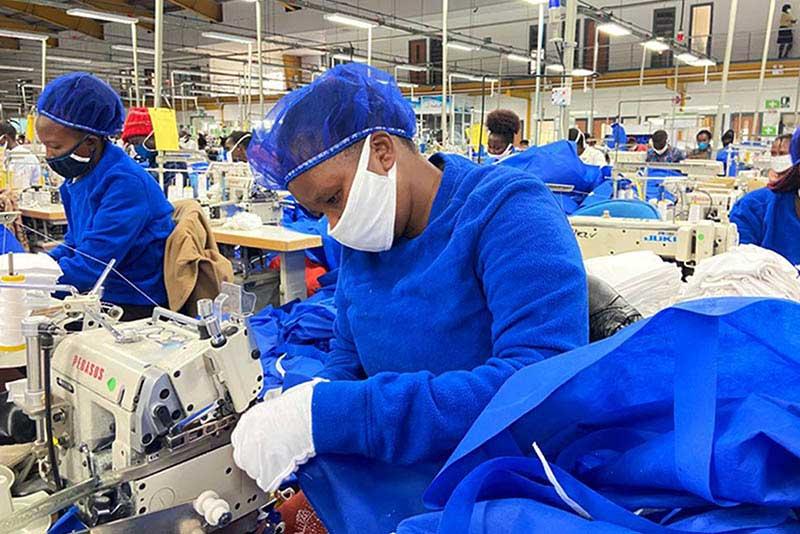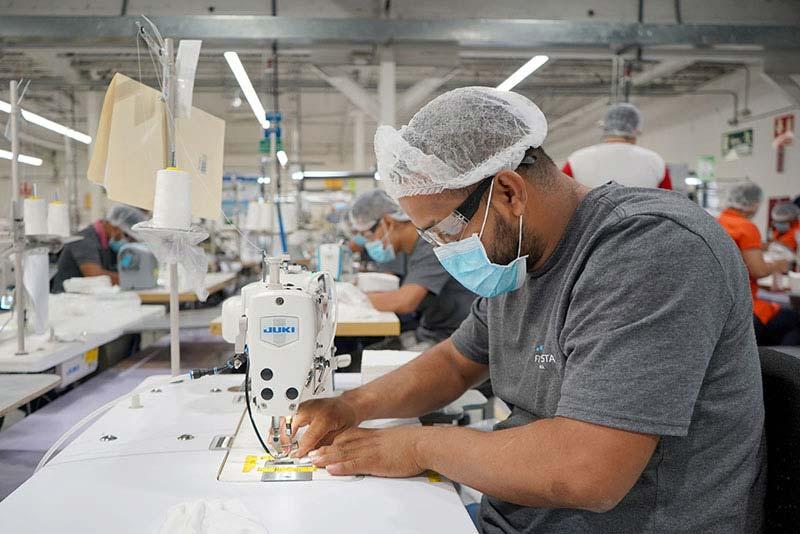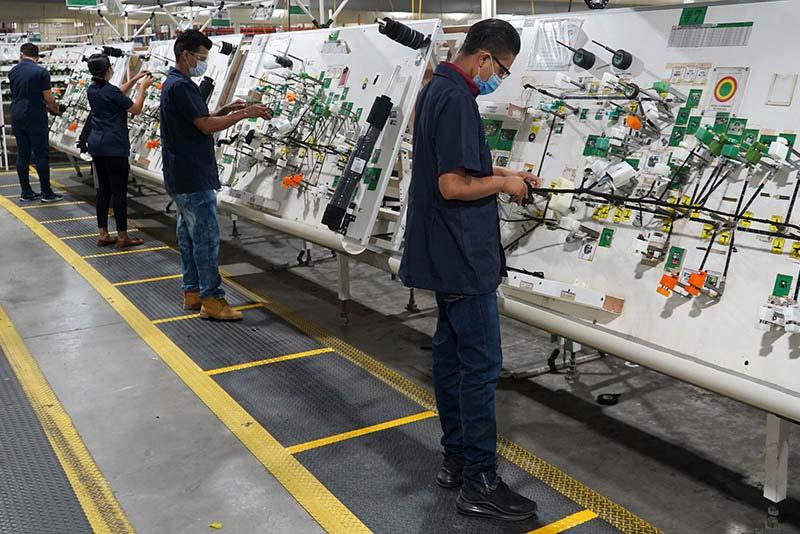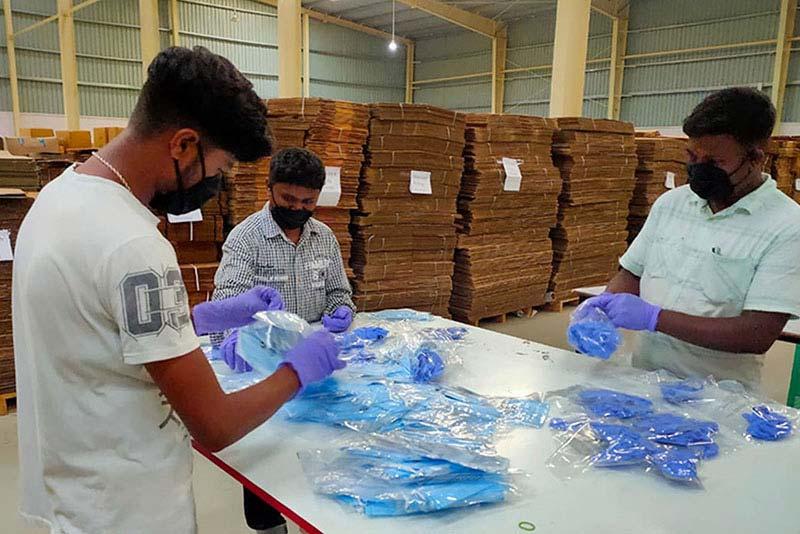By Devon Maylie, Monica De Leon, and Gayle Young
JOHANNESBURG, South Africa—When orders for shirts, trousers, skirts, and dresses suddenly dried up from buyers in the United States and Europe after the COVID-19 outbreak, Sri Lanka-based Hela Clothing didn’t panic. Instead, the company put skilled staff to work stitching personal protective equipment (PPE).
“This crisis has highlighted that many countries in Africa and other parts of the world don’t have their own medical PPE production. We’re all very dependent on China and a few other countries,” said Adam Collins, Group Economist and Special Projects Lead for Hela Clothing.
Hela swiftly retooled several of its factories, including one in Kenya that had been producing men’s underwear, and sourced new materials to help meet surging demand for PPE from hospitals and other essential industries in Africa.
Hela’s investment in PPE production mirrors that of other global manufacturers looking for an economic lifeline during the pandemic. Such investments are happening in factories around the world as part of an evolving and informal partnership between governments that need the protective equipment fast and private sector companies that need the work now.
Daunting Requirements
From Honduras to Kenya to India and beyond, private sector manufacturers have been producing masks, testing kits, and medical scrubs that have gone immediately from the factory floor to the front lines of hospitals fighting the pandemic.

Hela’s Kenya operation is responding to demand for medical masks and hazmat suits. Photo courtesy: Hela Clothing (2020).
The World Health Organization estimates that 89 million medical masks will be required every month to fight COVID-19—a 40 percent increase in the existing manufacturing capacity. Current global production of face masks today covers less than a quarter of the estimated demand, according to the WHO. As new COVID-19 cases accelerate in Africa, India, and Latin America, the demand for medical masks and other protective wear will remain urgent.
“Governments around the world are the new customers for apparel manufacturers producing PPE,” said Sabine Hertveldt, Stop-Winlock’s advisory lead for light manufacturing. “Increased collaboration between the private and public sector is critical.”
This partnership is especially important to help manufacturers overcome some of the key challenges to expand production, Hertveldt said. These include working together to establish standards, certification, and laboratory testing for PPE, and customs procedures, export tariffs, and export restrictions.
New Business Opportunities
But switching production from apparel to masks and gowns is easier said than done, according to Hertveldt. Over the past two months, manufacturers have collaborated with governments in Bangladesh, Cambodia, Ethiopia, Jordan, Kenya, Madagascar, Vietnam, and throughout Central America to shift part of their production to PPE. This effort increases supply while making it possible for manufacturers to continue paying workers after the total collapse in demand from global apparel brands and retailers.

Globally, 89 million medical masks will be required every month. Photo courtesy: Honduras Manufacturers Association (2020).
“Apparel manufacturers have the equipment and the capacity. And we need the products now,” said Heikki Mattila, a textile industry specialist who consults with IFC. “They are a critical part of the solution to this.”
For Hela’s operation in Kenya, that has meant working with the government to allow the company to sell more production domestically while also helping to supply neighboring countries.
Hela produced 10 million face masks in Kenya during April and May alone. About 90 percent of them were standard, three-ply surgical masks, while the rest were reusable fabric masks. The company’s Kenya operation is also acquiring the special machinery needed to produce more sophisticated N95 respirator masks, which filter out most airborne particles.
“In Africa, it’s a move that will meet critical demand where there is currently very limited production of the medical-grade N95 masks and one that opens a new line of business in the longer term for us,” said Collins.
“An Important Ally” in Central America
In Honduras, the government realized the country needed a lot more masks and other medical protective wear than was available. So it turned to the textile sector, the biggest in Central America, which was idled amid cancelled apparel orders.
“Our industry became an important ally to the health authorities,” said Mario Canahuati, President of the Honduran Maquila Association, which represents the textile industry. “It seems like we are setting the groundwork for a potential biomedical cluster to the textile industry.”

Honduran textile employees help produce protective wear. Photo courtesy: Honduras Manufacturers Association (2020).
The industry designed a responsible back-to-work process, following strict biosecurity protocols that were developed in coordination with epidemiologists and the national health and labor authorities. This includes sanitizing all employees’ shoes and hands and recording temperatures of employees before they enter the production facilities. It also means providing private transport to each employee amid travel restrictions in the country.
As a result of the private and public sector coordination, the reopening has enabled 17,000 employees to keep working. Honduras’ manufacturers have in the past two months produced over 11 million face masks, 1.3 million surgical scrubs, and more than 100,000 surgical overalls to supply over 60 hospitals, including many public hospitals, throughout the country. Some exports have reached the United States as well.
“We have returned to work with more motivation, knowing that the product we are making is helping prevent the spread of the disease, reducing contagion and deaths,” said Lady Ana Hernandez, who works at one of the textile manufactures that has shifted to mask production in San Pedro Sula.
In India, business-to-business packaging platform Bizongo repurposed its online digital marketplace to help connect manufacturers of masks, gloves, sanitizer, and protective suits to hospitals and other health-care facilities. Bizongo, an IFC investee, set up the platform within three days with 25 web designers working around the clock to create the PPE platform. It allows the company to match orders, considering volume of supplies, distance, and timing. Bizongo’s staff, working from home, arrange packing and delivery, mostly through Amazon, an existing client.
“India’s businesses are good at manufacturing, but when it comes to shipping and servicing demand, we discovered they are not so capable,” said Sachin Agrawal, who co-founded Bizongo in 2015. “So, we became their partner and help them with everything other than manufacturing so they can concentrate on that.”
In the first three weeks after launching its platform, Bizongo helped supply 1.1 million PPE kits to more than 100,000 workers throughout India. The company forecasts it will help supply 3.1 million PPE kits by the end of August.

Bizongo has supplied 1.1 million PPE kits throughout India. Photo courtesy: Bizongo (2020).
Focusing on Public Hospitals
The scale of the challenge in India alone is enormous. In early April the ministry of health projected a need for 17 million PPE kits. The government has been supportive of the private companies and distributors, according to Agrawal, while ensuring quality control and protecting against price gouging. India initially banned PPE gear from being sold outside of the country to avoid a shortage during the crisis, but partially lifted the ban in May to allow the export of non-medical face masks.
One recipient of the PPE kit, Dr. Jayakuma T.K., who works in a public hospital in Jodhpur, was happy with the speed of production. “They delivered our requirement within five days,” he said.
Agrawal estimates 90 percent of the PPE platform’s users are new to Bizongo and most of their goods are going to public hospitals, which dominate India’s health-care landscape.
“India’s manufacturers are super-fast, super-quick at turn-around, and they are able to pivot,” he said. “Right now, we are focused on India, but we can foresee a future in international markets.”
Maylie reported from Johannesburg, De Leon from Panama City, and Young from Washington, D.C. Aliza Marcus from Washington, D.C. contributed to reporting.
Published in June 2020

